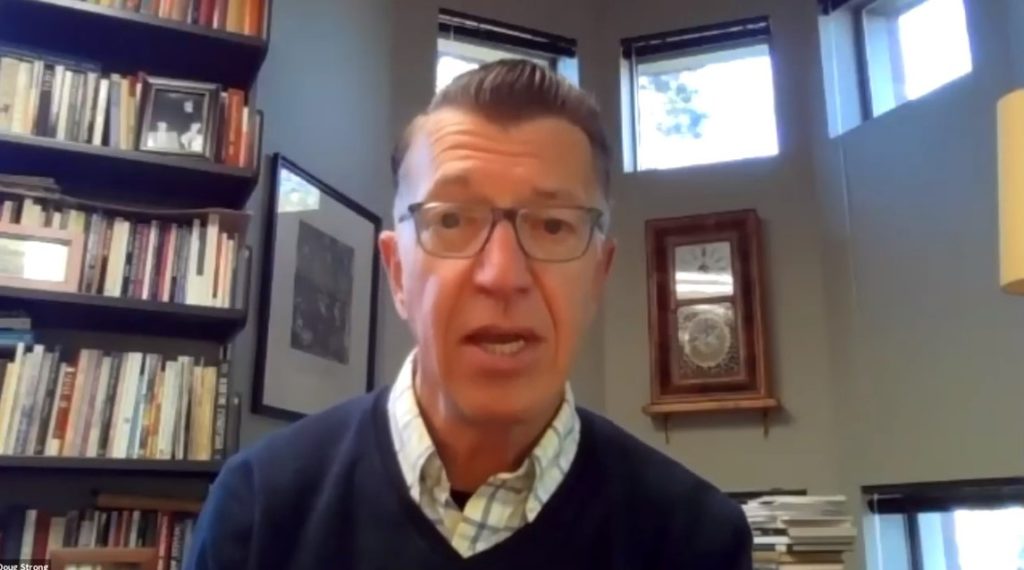Dr. Douglas Strong has spent much of his career warning against the tendency within the Methodist tradition to choose between a false dichotomy of evangelistic piety and social justice advocacy.
Instead, Strong asserts that orthodox Wesleyan tradition not just includes — but commands — room for both. The School of Theology Dean and Professor of the History of Christianity at Seattle Pacific University recently joined the UMC Baltimore-Washington Conference’s “Training Tuesdays” series to give a lecture on the topic, aptly titled “Jesus & Justice.”
Strong prefaced his presentation by outlining divisions and polarities found in our society, culture, and the church, which he asserts don’t have to be there. Such polarities are “especially not necessary as Wesleyans and as Methodists,” Strong insisted.
“For the last century or so, United Methodists (and members of other American churches) have been stuck in a polarized and divided religious environment, in which various Christians champion either a personal gospel of evangelism and discipleship or a social gospel of justice advocacy,” Strong stated in introduction to his presentation.
“This false dichotomy is neither scriptural nor true to the Wesleyan heritage. Many eighteenth and nineteenth century Methodists kept Jesus and justice together, due to their convictions about sanctification,” Strong noted. “We can do the same.”
Strong emphasized John Wesley’s “universal offer of grace” and vision of conversions to “real Christianity.” According to Strong, these Wesleyan fundamentals are especially relevant in the present day.
“To be a real Christian, one that holds to faith and must make account for it, is something that takes some courage these days, I would say.” He described his own personal experience of living in Seattle, which he characterized as a city with very little nominal Christianity. In his view, being a Christian in such areas of the country “is going to actually mean something.”
Strong linked this meaning to Wesley’s “real Christianity,” which he described as both evangelistic, in that it entails sharing Jesus with other people so that they can be renewed in faith, and pietistic, as it stresses the spiritual disciplines of prayer, study of Scripture, and existence of small groups for mutual accountability.
According to Strong, Methodists who are hesitant to evangelize the Wesleyan message should not only reconsider, but are missing one of the two pillars of Wesley’s “real Christianity,” in that Wesleyans are called to give a “perceptible testimony of God’s spirit.”
“This idea is that the internal testimony of the spirit grips us so, affects us so, that we can’t help but share it. We do so because we’re bubbling over with enthusiasm and joy for what it is that God has done for us,” expressed Strong.
Of course, Wesley’s message did not stop at evangelism and piety. John Wesley emphasized sanctification, the belief that God desires all people to grow in holiness and become more Christ-like.
The holy life of a “real Christian,” according to Wesley, included being anti-slavery and anti-racist. Strong highlighted Wesley’s belief that God doesn’t tolerate people getting rich from other people’s toil or allow for demeaning another person’s humanity.
Strong further stressed that the early American Methodists reflected Wesley’s theology in their behavior. In early American Methodism, no Methodist could be a slaveholder. Moreover, the early American Methodists incorporated Wesley’s message of evangelistic and pietistic new birth, along with justice-oriented sanctification, into their sermons throughout the country.
“Later, the pressures of American society caused Methodists to segregate just like others were in America,” Strong lamented.
Throughout the years of slavery, however, orthodox Methodists continued to combine Wesley’s message of evangelism and social justice advocacy. Strong described the life of Freeborn Garrettson, one such Methodist who was born to an aristocratic slave-owning family, encountered Methodist preachers such as Francis Asbury (which converted him to the Wesleyan tradition), and later emancipated the people whom his family had enslaved.
Garrettson later became a famous Methodist preacher and was even jailed for preaching against slavery.
Furthermore, Strong professed that African Americans were especially drawn to Methodist revivalism. This was in large part due to the fact that “the whole white supremacist argument that said that whites are better and blacks are inferior was completely thrown apart in the Methodist message,” with its emphasis on sanctification for all, insisted Strong.
In spite of today’s rife divisions among followers of the Wesleyan message, Strong maintains that Methodists do not have to choose between polarities. This especially holds true for preachers in the pulpit.
“I’ll be blunt here — I don’t think most people are really preaching a very Wesleyan message in most Methodist churches,” declared Strong.
“As Wesleyans, we’ve got it [Jesus and justice]. We don’t have to go anywhere. We’ve got all that in our DNA. We just have to preach it,” Strong concluded.
Strong’s entire message can be found here as an installment of the UMC Baltimore-Washington Conference’s “Training Tuesdays.”






Comment by betsy on April 29, 2021 at 1:17 pm
My extensive experience with the Methodist/United Methodist Church is that two have come unhinged.
Furthermore, my own perusal of Wesley’s writings taught me that he never approached the poor with a social justice initiative but rather with a message of how God loves even them. And it was through the pursuit of holiness under Wesley’s guidance and tutelage that the conditions of the poor substantially improved over the years .
Comment by David Gingrich on May 1, 2021 at 8:41 am
I have never met an evangelical Christian who said we should not help the poor. But the West is FULL of liberals who refuse to humbly obey God’s Word.
Comment by bobhorts on May 1, 2021 at 10:23 am
Humbly, do not equate social justice with just the “poor”. Certainly, poverty is a consequence of the history of racial injustice in the US – racial injustice at both the personal and governmental level. Jesus’ teachings about helping the widow, orphan, and poor are among his most prolific teachings on the subject of interpersonal relationships. But many minorities of means in the Black, Asian, etc., communities feel the pain of racial injustice even though they can coffee at Starbucks. They also suffer with those of their group who bear the brunt of the history of racism in this country. And Jesus’ teachings on the poor were also meant as a warning to those who have the resources to help others of the danger of allowing poverty to exist in a nation of plenty. For, money is the root of all sorts of evil, and it is harder for a rich man, etc., etc. That is, your greed and insensitivity toward those in need may come at a cost (although whatever that cost may be, it doesn’t seem to be enough to change behaviors in many instances). If the Christians of any means in this country really lived by Jesus’ teachings about not storing up treasures on earth which moth and rust destroy and which the thief breaks in and steals, and not worrying about what tomorrow will bring (which the “poor” worry about most every day, ), etc., there would be far less poverty in the US. Alas, that won’t happen with the Christian leadership in this country. Rather, Christians will complain about the government helping those in need through governmental programs, which is necessary because the folks in this “Christian” nation will never fulfill their responsibilities as taught in the Gospels. This writer (me) is one who believes himself to be quite generous, but not like the widow who gave more than the rich man. Maybe someday I will actually do as Jesus taught, stop worrying about having enough to retire without need, and actually inherit the Kingdom both as one poor in Spirit and in wealth.
Comment by Phil on May 1, 2021 at 2:41 pm
Betsy,
Wesley never used the term social justice, but he did engage in practices akin to many forms of social activism employed by those who call themselves social justice advocates today. He didn’t just preach love and good news for poor. His societies actively worked to make their lives better through the establishment of orphanages, hospitals, children’s schools, and even early predecessors to trade schools to teach job skills. He supported prison reform. He also led the Methodists in national boycotts on cotton and tobacco, effectively tying to “cancel” these industries because of their dependence on slave labor. He also supported the use of a government dole to provide direct aid to the poor (which Britain had already been doing for a hundred years before Wesley).
Comment by John Smith on May 3, 2021 at 6:52 am
Selective reading of methodist history considering the large portion that supported slavery but in the end this simply talks around everything. We can evangelize and have social justice! (as long as we don’t define either)